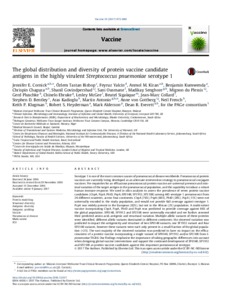Cornick, Jennifer E. and Tastan Bishop, Özlem and Yalcin, Feyruz and Kiran, Anmol M. and Kumwenda, Benjamin and Chaguza, Chrispin and Govindpershad, Shanil and Ousmane, Sani and Senghore, Madikay and du Plessis, Mignon and Pluschke, Gerd and Ebruke, Chinelo and McGee, Lesley and Sigaùque, Beutel and Collard, Jean-Marc and Bentley, Stephen D. and Kadioglu, Aras and Antonio, Martin and von Gottberg, Anne and French, Neil and Klugman, Keith P. and Heyderman, Robert S. and Alderson, Mark and Everett, Dean B. and PAGe consortium, .
(2017)
The global distribution and diversity of protein vaccine candidate antigens in the highly virulent Streptococcus pnuemoniae serotype 1.
Vaccine, 35 (6).
pp. 972-980.
![[img]](https://edoc.unibas.ch/style/images/fileicons/application_pdf.png)  Preview |
|
PDF
- Published Version
Available under License CC BY-NC-ND (Attribution-NonCommercial-NoDerivatives).
1676Kb |
Official URL: http://edoc.unibas.ch/54423/
Downloads: Statistics Overview
Abstract
Serotype 1 is one of the most common causes of pneumococcal disease worldwide. Pneumococcal protein vaccines are currently being developed as an alternate intervention strategy to pneumococcal conjugate vaccines. Pre-requisites for an efficacious pneumococcal protein vaccine are universal presence and minimal variation of the target antigen in the pneumococcal population, and the capability to induce a robust human immune response. We used in silico analysis to assess the prevalence of seven protein vaccine candidates (CbpA, PcpA, PhtD, PspA, SP0148, SP1912, SP2108) among 445 serotype 1 pneumococci from 26 different countries, across four continents. CbpA (76%), PspA (68%), PhtD (28%), PcpA (11%) were not universally encoded in the study population, and would not provide full coverage against serotype 1. PcpA was widely present in the European (82%), but not in the African (2%) population. A multi-valent vaccine incorporating CbpA, PcpA, PhtD and PspA was predicted to provide coverage against 86% of the global population. SP0148, SP1912 and SP2108 were universally encoded and we further assessed their predicted amino acid, antigenic and structural variation. Multiple allelic variants of these proteins were identified, different allelic variants dominated in different continents; the observed variation was predicted to impact the antigenicity and structure of two SP0148 variants, one SP1912 variant and four SP2108 variants, however these variants were each only present in a small fraction of the global population (<2%). The vast majority of the observed variation was predicted to have no impact on the efficaciousness of a protein vaccine incorporating a single variant of SP0148, SP1912 and/or SP2108 from S. pneumoniae TIGR4. Our findings emphasise the importance of taking geographic differences into account when designing global vaccine interventions and support the continued development of SP0148, SP1912 and SP2108 as protein vaccine candidates against this important pneumococcal serotype.
| Faculties and Departments: | 09 Associated Institutions > Swiss Tropical and Public Health Institute (Swiss TPH)
09 Associated Institutions > Swiss Tropical and Public Health Institute (Swiss TPH) > Department of Medical Parasitology and Infection Biology (MPI) > Clinical Immunology (Daubenberger) |
|---|
| UniBasel Contributors: | Pluschke, Gerd |
|---|
| Item Type: | Article, refereed |
|---|
| Article Subtype: | Research Article |
|---|
| Publisher: | Elsevier |
|---|
| ISSN: | 0264-410X |
|---|
| Note: | Publication type according to Uni Basel Research Database: Journal article |
|---|
| Language: | English |
|---|
| Identification Number: | |
|---|
| edoc DOI: | |
|---|
| Last Modified: | 03 Nov 2017 10:56 |
|---|
| Deposited On: | 24 Apr 2017 13:53 |
|---|
Repository Staff Only: item control page
